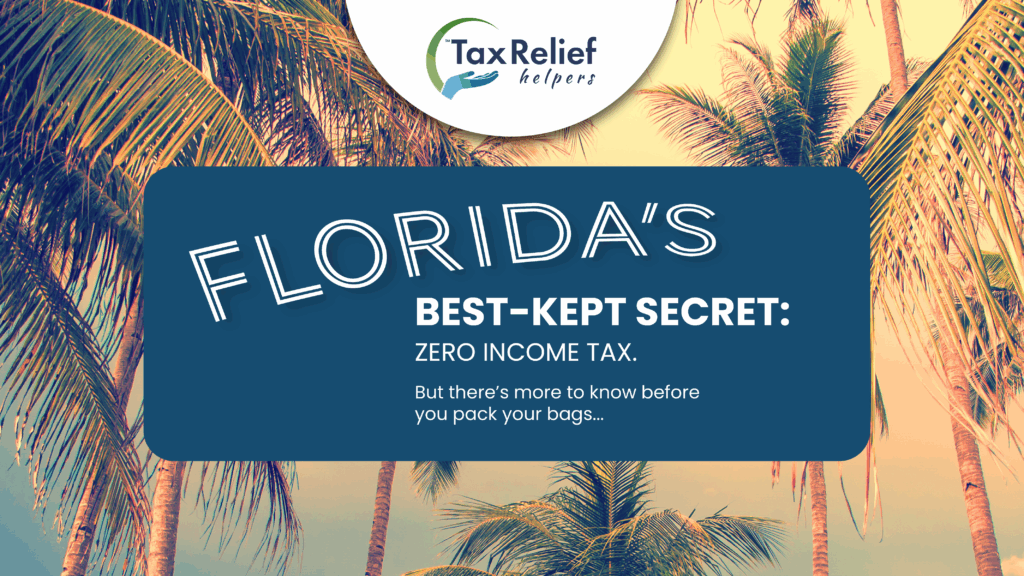Are you wondering, “Does Florida have state income tax?” If so, you’re not alone. Thousands of people consider moving to the Sunshine State every year, many drawn by its appealing beaches, warm weather, and most notably, its tax-friendly policies.
For individuals and families looking to reduce their tax burden, Florida stands out as one of the few states that does not impose a personal income tax. But while that may sound like a financial paradise, it’s important to understand what this means, and doesn’t mean for your overall tax responsibilities.
Florida is one of nine U.S. states that do not levy a personal income tax, which makes it particularly attractive to retirees, remote workers, and high-net-worth individuals. But that doesn’t mean Florida is tax-free.
How Florida Generates Revenue Instead
Rather than relying on income tax, Florida funds public services through:
- Sales taxes (state rate: 6%, with local add-ons up to 2.5%)
- Property taxes
- Corporate income taxes
- Fuel and tourism-related taxes
- Document stamp taxes on real estate transfers
This tax structure allows residents to keep more of their paycheck while still supporting state infrastructure and services through consumption-based taxes.
Does Florida Have State Income Tax?
No, Florida does not have a state income tax. The Florida Constitution explicitly prohibits it. As a result:
- You will not pay taxes on your wages or salary at the state level.
- There is no state filing requirement for individual income tax in Florida.
- Your Social Security benefits, pensions, and retirement withdrawals are not taxed by the state.
This makes Florida a true no-income-tax state, with significant benefits for residents compared to states like California or New York, where income taxes can be quite steep.
Why Florida Doesn’t Tax Individual Income
Florida’s no-income-tax policy isn’t an accident; it’s embedded in the state’s DNA.
- In 1924, Florida voters approved a constitutional amendment banning a personal income tax.
- Any future change would require a voter-approved constitutional amendment—an unlikely scenario in Florida’s low-tax climate.
How It Affects the State Budget
- To compensate, Florida leans heavily on tourism-related revenue, such as hotel, rental car, and amusement taxes.
- The state also benefits from having no state debt obligations, which allows it to maintain this tax-friendly stance.
What Taxes Do Florida Residents Pay?
While there’s no Florida income tax, residents still face several types of taxation:
1. Sales Tax
- State sales tax rate: 6%
- Counties can add up to 2.5% more, depending on the location.
2. Property Tax
- Based on the assessed value of your property.
- Florida ranks mid-range nationally for property tax burden.
3. Corporate Income Tax
- Applies to C corporations, not individuals.
- Flat rate: 5.5%, although recent legislation offers reductions in specific cases.
4. Fuel, Alcohol, and Tobacco Taxes
- Florida collects excise taxes on gasoline, diesel, cigarettes, and alcohol.
5. Tourist and Rental Taxes
- Hotel stays, vacation rentals, and even car rentals incur extra tourism-related taxes.\
Who Benefits the Most from Florida’s Tax Policy?
1. Retirees
Florida is a top retirement destination thanks to:
- No tax on pensions, 401(k), or Social Security
- No estate or inheritance tax
- Homestead exemption of up to $50,000 for property owners
2. High-Income Earners
Professionals and business owners can save tens of thousands of dollars annually by avoiding income tax altogether.
3. Remote Workers and Digital Nomads
The rise of remote work means more professionals are relocating to tax-friendly states like Florida for financial and lifestyle advantages.
How to Maximize Your Tax Savings in Florida
Even without a state income tax, you can take steps to reduce your overall tax burden.
1. Optimize Retirement Income
- Convert traditional IRAs to Roth IRAs before moving to Florida to avoid state taxes elsewhere.
2. Consider Asset Location Strategies
- Allocate more taxable investments while living in Florida to benefit from no state capital gains tax.
3. Use the Homestead Exemption
- Protect a portion of your primary residence’s value from property taxes.
4. Keep Domicile Records
- Maintain documentation (utility bills, voter registration, etc.) to prove Florida residency.
5. Plan for Part-Year Residency
- If splitting time between states, consult a tax professional to navigate complex residency rules.
Final Thoughts
So, does Florida have state income tax? Absolutely not. And for many individuals and families, that makes it one of the most financially attractive places to live in the U.S.
But while Florida’s lack of income tax offers huge advantages, understanding the full tax landscape—property, sales, and other consumption-based taxes—is key to making informed financial decisions.
If you’re thinking about moving to Florida or want to optimize your tax situation as a current resident, it’s always wise to consult with a trusted tax professional.
Common Questions About Florida Taxes
Is Social Security Taxed in Florida?
No. Florida does not tax Social Security income at all.
Do I Still Pay Federal Taxes?
Yes. You are still subject to federal income taxes. Florida’s policies only affect state-level taxation.
Are Capital Gains Taxed in Florida?
Florida does not impose a separate capital gains tax. You are only subject to federal capital gains taxes.
Written by: Thomas Brooks
Published: November 17, 2025
